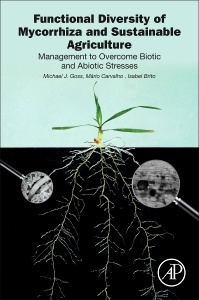Description
Functional Diversity of Mycorrhiza and Sustainable Agriculture
Management to Overcome Biotic and Abiotic Stresses
Authors: Goss Michael J., Carvalho Mário, Brito Isabel
Language: English
Subjects for Functional Diversity of Mycorrhiza and Sustainable...:
Keywords
AMF abundance and diversity; AMF assemblages; AMF propagule types; Abiotic stress; Abiotic stresses; Agricultural land bank; Agricultural production; Agriculture practices; Agronomic practices; Arbuscular mycorrhiza; Benefits from early colonization; Biocontrol; Biological diversity; Biological diversity in AMF; Biotic and abiotic stress; Biotic stress; Biotic stresses; Chemical signaling; Colonization mechanisms; Commercial inoculum; Crop diversification; Cropping sequences; Cropping system; Ecological roles; Environmental impacts; Fabeacea; Fertilizers; Functional diversity; Functional diversity in AMF; Genetic and molecular markers; Host benefits; Indigenous AMF; Intact extraradical mycelium; Interactions through host and AMF diversity; Mycorrhizal helper bacteria; Mycorrhizal networks; Nutrient acquisition; Operational taxonomic unit; Pesticides; Population growth; Rhizobia; Small and large ribosomal subunits; Soil; Soil biota; Sustainable intensification; Sustainable management; Technological solutions; Tillage; Timing of colonization; Tripartite symbiosis; Water relations; Yield gap
102.64 €
In Print (Delivery period: 14 days).
Add to cartSupport: Print on demand
Description
/li>Contents
/li>Biography
/li>Comment
/li>
Functional Diversity of Mycorrhiza and Sustainable Agriculture is the first book to present the core concepts of working with Arbuscular mycorrhizal fungi to improve agricultural crop productivity.
Highlighting the use of indigenous AM fungi for agriculture, the book includes details on how to maintain and promote AM fungal diversity to improve sustainability and cost-effectiveness. As the need to improve production while restricting scarce inputs and preventing environmental impacts increases, the use of AMF offers an important option for exploiting the soil microbial population. It can enhance nutrient cycling and minimize the impacts of biotic and abiotic stresses, such as soil-borne disease, drought, and metal toxicity.
The book offers land managers, policymakers, soil scientists, and agronomists a novel approach to utilizing soil microbiology in improving agricultural practices.
1. Introduction2. Agronomic opportunities to modify soil conditions considered supportive of arbuscular mycorrhizal fungi3. The roles of mycorrhizas and current constraints to their intentional use in agriculture4. Arbuscular mycorrhizal fungi (AFM) biodiversity5. Interactions between arbuscular mycorrhizal fungi and other soil microbes in the rhizosphere and impacts on host plants6. The significance of the intact extraradical mycelium (ERM) in managing arbuscular mycorrhizal fungi7. New tools to investigate biological diversity8. Management of arbuscular mycorrhizal fungi biological diversity within crooping systems
Professor Mário Carvalho’s research interests are related to different aspects of low input cropping systems; tillage systems, crop rotation, integrated weed control and nutrient management. In addition he has developed a very close contact with producers over the past 30 years, establishing a solid scientific and practical knowledge of cropping system management under conservation agriculture. More recently his focus has been on the use of symbioses, specifically arbuscular micorrhiza and rhizobia, in bio-protection of cultivated plants within the cropping systems.
Dr. Isabel Brito’s research field is the management of native arbuscular mycorrhizas in low input cropping systems, particularly in Mediterranean regions. Key areas of study are the effects of common agronomic practices (weed control, tillage system and crop rotation) on AMF diversity and AM colonization of small grain crops. More recently she has focused on developing strategies to manage indigenous AMF within cropping systems for the bio-protection of cultivated plants.
- Provides a new approach to exploiting the benefits of mycorrhizas for sustainable arable agricultural production using indigenous AMF populations and adopting appropriate crop production techniques
- Bridges the gap between soil microbiology, including increasing knowledge of mycorrhiza and agronomy
- Presents real-world practical insights and application-based results, including a chapter focused primarily on case studies
- Includes extensive illustrative diagrams and photographs




